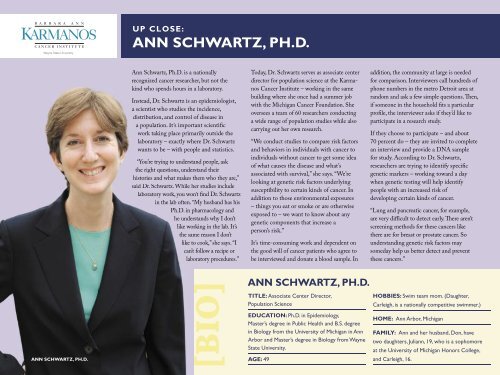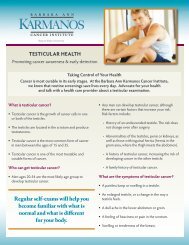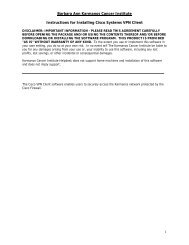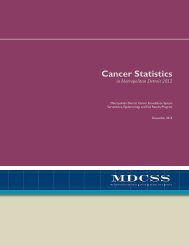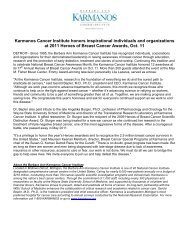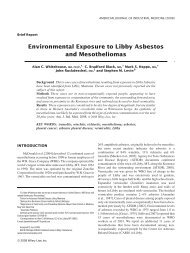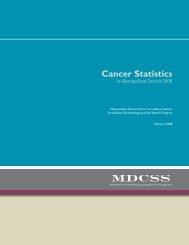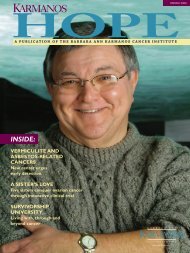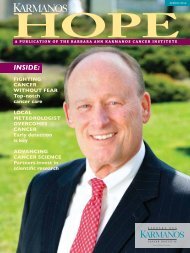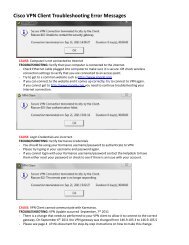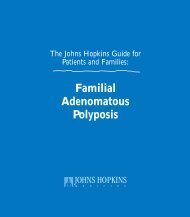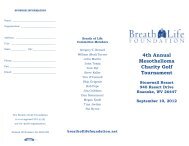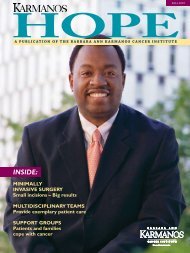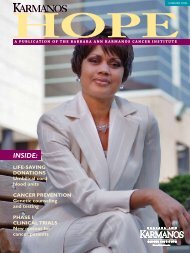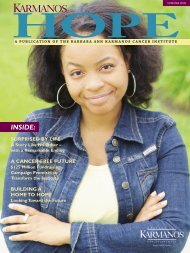Fall 2006 - Karmanos Cancer Institute
Fall 2006 - Karmanos Cancer Institute
Fall 2006 - Karmanos Cancer Institute
You also want an ePaper? Increase the reach of your titles
YUMPU automatically turns print PDFs into web optimized ePapers that Google loves.
UP CLOSE:<br />
ANN SCHWARTZ, PH.D.<br />
Ann Schwartz, Ph.D. is a nationally<br />
recognized cancer researcher, but not the<br />
kind who spends hours in a laboratory.<br />
Instead, Dr. Schwartz is an epidemiologist,<br />
a scientist who studies the incidence,<br />
distribution, and control of disease in<br />
a population. It’s important scientific<br />
work taking place primarily outside the<br />
laboratory – exactly where Dr. Schwartz<br />
wants to be – with people and statistics.<br />
“You’re trying to understand people, ask<br />
the right questions, understand their<br />
histories and what makes them who they are,”<br />
said Dr. Schwartz. While her studies include<br />
laboratory work, you won’t find Dr. Schwartz<br />
in the lab often. “My husband has his<br />
Ph.D. in pharmacology and<br />
he understands why I don’t<br />
like working in the lab. It’s<br />
the same reason I don’t<br />
like to cook,” she says. “I<br />
can’t follow a recipe or<br />
laboratory procedures.”<br />
Today, Dr. Schwartz serves as associate center<br />
director for population science at the <strong>Karmanos</strong><br />
<strong>Cancer</strong> <strong>Institute</strong> – working in the same<br />
building where she once had a summer job<br />
with the Michigan <strong>Cancer</strong> Foundation. She<br />
oversees a team of 60 researchers conducting<br />
a wide range of population studies while also<br />
carrying out her own research.<br />
“We conduct studies to compare risk factors<br />
and behaviors in individuals with cancer to<br />
individuals without cancer to get some idea<br />
of what causes the disease and what’s<br />
associated with survival,” she says. “We’re<br />
looking at genetic risk factors underlying<br />
susceptibility to certain kinds of cancer. In<br />
addition to those environmental exposures<br />
– things you eat or smoke or are otherwise<br />
exposed to – we want to know about any<br />
genetic components that increase a<br />
person’s risk.”<br />
It’s time-consuming work and dependent on<br />
the good will of cancer patients who agree to<br />
be interviewed and donate a blood sample. In<br />
addition, the community at large is needed<br />
for comparison. Interviewers call hundreds of<br />
phone numbers in the metro Detroit area at<br />
random and ask a few simple questions. Then,<br />
if someone in the household fits a particular<br />
profile, the interviewer asks if they’d like to<br />
participate in a research study.<br />
If they choose to participate – and about<br />
70 percent do – they are invited to complete<br />
an interview and provide a DNA sample<br />
for study. According to Dr. Schwartz,<br />
researchers are trying to identify specific<br />
genetic markers – working toward a day<br />
when genetic testing will help identify<br />
people with an increased risk of<br />
developing certain kinds of cancer.<br />
“Lung and pancreatic cancer, for example,<br />
are very difficult to detect early. There aren’t<br />
screening methods for these cancers like<br />
there are for breast or prostate cancer. So<br />
understanding genetic risk factors may<br />
someday help us better detect and prevent<br />
these cancers.”<br />
ANN SCHWARTZ, PH.D.<br />
[BIO]<br />
ANN SCHWARTZ, PH.D.<br />
TITLE: Associate Center Director,<br />
Population Science<br />
EDUCATION: Ph.D. in Epidemiology,<br />
Master’s degree in Public Health and B.S. degree<br />
in Biology from the University of Michigan in Ann<br />
Arbor and Master’s degree in Biology from Wayne<br />
State University.<br />
AGE: 49<br />
HOBBIES: Swim team mom. (Daughter,<br />
Carleigh, is a nationally competitive swimmer.)<br />
HOME: Ann Arbor, Michigan<br />
FAMILY: Ann and her husband, Don, have<br />
two daughters, Juliann, 19, who is a sophomore<br />
at the University of Michigan Honors College,<br />
and Carleigh, 16.


